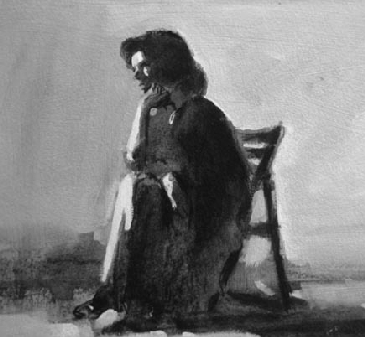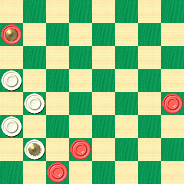The Checker Maven
Jump to navigationA Thinker's Game

Those of us who play checkers in any sort of serious manner know very well that checkers is indeed a "thinker's" game, despite our oft-repeated laments that the general public doesn't usually share that opinion. Today's entry in our ongoing Checker School series demonstrates the fine line that can separate victory from just another drawn game; it takes a real thinker to see the difference between moves that look very similar but are far from it.
The situation is diagrammed below.
WHITE

BLACK
Black to Play and Win
B:W20,16,12,K8:BK28,13,7,3.
You'll see in the solution notes and sample game the interesting manner in which this position came about, but for now, can you think your way to a Black victory, or will a thoughtless move give up your winning chances? Think it over, and then click on Read More to see the solution, thoughtful notes, and a sample game.![]()
Solution
The solution, sample game, and lettered notes are from Ben Boland's Famous Positions in the Game of Checkers. Numbered notes are by the editor, using Martin Fierz's CheckerBoard program running Ed Gilbert's KingsRow engine with the 10-piece endgame database.
28-24---A, 8-11, 7-10, 11-7---5, 10-14, 7-2, 24-19, 16-11, 19-15, 11-7, 3-10, 2-6, 14-17---B, 20-16, 17-21---C, 16-11, 15-8, 12-3, 10-15, 6-10, 15-19, 10-15, 19-24, 15-19, 24-27, 19-23, 27-31, 3-7, 21-25, 7-10, 25-30, 10-14, 31-26, 23-27, 30-25, 27-24, 25-21, 24-19, 13-17. Black Wins.
Game: 11-15, 22-18, 15-22, 25-18, 8-11, 29-25, 4-8, 24-20, 10-15, 25-22, 12-16, 21-17, 8-12, 17-14, 16-19, 23-16, 12-19, 27-23, 9-13, 23-16, 6-10, 14-9---1, 5-23, 26-19, 15-24, 28-19, 1-6---2, 32-28, 6-9, 30-26, 9-14---3, 26-23, 14-17, 28-24, 17-26, 31-22, 2-6---D, 16-12, 6-9, 19-16, 9-14, 22-18, 14-17, 18-14, 17-22, 14-9, 22-26, 9-6, 26-31, 6-2, 31-26, 2-6---4, 26-28, 6-8. Forms above position- Spayth's American Draughts Player, 1860.
A---Corrects A. D. P., where 7-10, 8-11, is given to draw.
B---14-18, 20-16, 18-22, 16-11, 15-8, 12-3, 10-14---6, 6-9, 14-17, 9-14, 17-21, 14-17, 22-25, 17-22, 25-29, 3-7, 21-25, 7-10, 25-30, 10-14, 30-25, 14-18. Drawn.
C---10-14 only draws.
D---10-14, 22-18, 14-17, 16-12, 7-10, 18-14, 2-7, 19-16, 17-22, 14-9, 10-14, 9-6, 22-26, 6-2, 26-31, 23-19, 31-27, 19-15. Drawn. A. D. P. The above position by W. Reid may be found as Position No. 14, the Draught Board, March 1871, and No. 338 in Lyman's Problem Book.
1---Computer analysis shows us that this is a likely loss, with 32-27 given for a draw.
2---This gives back much of the edge; 10-14 would have preserved the likely win.
3---The game is even.
4---This move is the real loser. The coming exchanges leave White in a loss. Correct was 23-19 leading to a draw.
5---11-8 also loses.
6---The analysis here is incorrect. 10-15 preserves the Black win, whereas the text move, 10-14, only draws. As we often say, checkers is subtle indeed.
"Patience, courage, courtesy and self-reliance are essential to a successful pursuit of the game. Patience to investigate calmly and accurately the consequences attending each move; courage to act with promptitude and decision, and to bear with equanimity the reverses sustained in competition with a player of superior judgment; courtesy, which implies forbearance to and the recognition of equal rights and advantages for an adversary; and self-reliance, which begets independent judgment, the first practical step to mental culture and progress in this as in all other sciences.
"Even in its negative features, the game of draughts is entitled to our respectful admiration. Totally devoid of chance, its influences are repellent of the excesses which disfigure and militate against games in general. The abuse of intoxicating liquor cannot be associated with it, the indulgence in which, being at all times preventive to its practical development. Nor can the mischevious and alluring propensity of gambling be justly laid to its charge. In contests for the championship where the highest stakes are played for, the players whatever be their success, are but ill requited for the labor involved and the time spent in bringing the match to a conclusion. There is but the honorable ambition to excell in a mental conflict. At this game the ordinary and habitual gambler has no chance. Truly its intellectual grasp lies far beyond his comprehension."---The Draught Board.
You can email the Webmaster with comments on this article.
